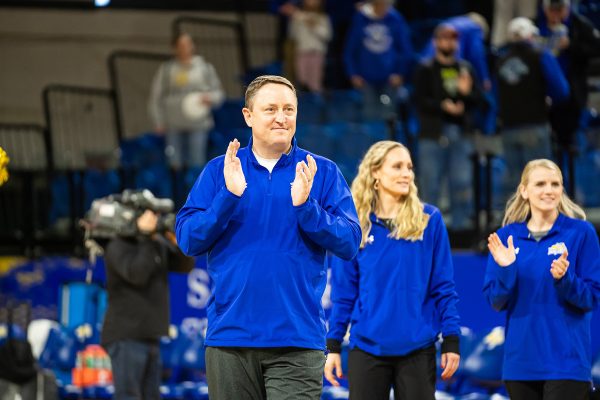Experiential learning offers career development
April 13, 2016
Kole Kramer wore a $60,000 piece of equipment on his back the first day at his internship.
Kramer, a junior electrical engineering major, was the nuclear engineering intern at the Puget Sound Naval Shipyard where he gained experience with expensive machinery and 3-D printing. He participated in experiential learning through the internship, which ultimately helped Kramer discover his interest in 3-D printing.
This is the type of experience that South Dakota State University officials want students to have. The College of Arts and Sciences created a certificate where students will graduate with hands-on learning experiences similar to Kramer’s experience.
The experiential certificate was launched fall 2015. Prior to offering the certificate, a task force formed in 2013 to decide what a program dedicated to experiential learning would look like at SDSU.
Kathie Erdman Becker, the experiential learning coordinator, said this type of program would be built into a student’s major.
Students participating in the certificate are required to take a class, EXPL 280, that introduces them to the experiential learning program. The class runs the second half of the semester. Due to a new academic undergraduate catalog, the certificate is available to only incoming freshman and sophomores, but the class is open to all levels.
“[The class] is really the vehicle to document all of these things that students are doing to learn outside of the classroom,” Becker said.
In the introductory class, students create an electronic portfolio linked on D2L and the experiences students complete for their certificate are documented on their transcript. Students can access the portfolio after the class for a fee.
Employers want to know how students have used the skills they have learned in the classroom in a practical setting and how they have overcome difficult situations in a work environment, Becker said.
Students need to complete 15 credits of applied learning, scholarly activity or service learning, field-based learning, integrative learning and travel studies or study abroad. In addition to experience, they need to have some form of reflection on what they did, depending on the discipline.
“We want these to be really authentic, meaningful experiences and I think they are happening but we want to make sure students are guided in how they are observing while they are in that process,” Becker said.
One of the advocates for more experiential learning was Dean Dennis Papini.
“What we’ve not done a very good job of is treating these things comprehensively and measuring their impact,” Papini said.
Papini advocated for this certificate to prepare the majority of students who would graduate and enter the workforce, but did not have experience that would get them a job upon graduation. Additionally, the certificate fought the perception of the decreasing value of a liberal education.
“[W]e have a bit of a disconnect with employers who are saying these are qualities we want but these are not the qualities that students are presenting,” Papini said. “The problem isn’t that students don’t have these skills. The problem is that we typically only ask them to engage in these skills in the classroom.”
The certificate is one of the ways the college is trying to help students attain jobs after graduation. The College of Arts and Sciences also mandated incoming students to get a minor in addition to their major.
“The minors are there to add knowledge, skills and competencies,” Papini said. “Experiential learning is there to get you to apply those things outside of the classroom to transfer the learning from one setting to another.”
Overall, Becker said the certificate allows students experiences to be regulated and approved by university standards.
“It gives it a standard way to tell our story to the community about the great work that our students are doing,” Becker said. “There’s a lot of things that are happening that just wouldn’t have happened in our community if we didn’t have students that were willing to serve and faculty to coordinate the experience.”
Faculty and students shared their experiences with experiential learning at the EXPL EXPO on April 4. During the expo, people were able to look at poster projects students created, attend speakers and listen to panel discussions.
Kramer participated in a panel focused on projects and experiences beyond the classroom. He has had multiple internships at various companies.
For Kramer, internships are “on the job training.” During one of his internships, he was given parts of a machine, but then his job was to put all of the parts together.
“I got to implement a new procedure supplementary to my education,” Kramer said. “Those are experiences I never would have learned here at State.”
























